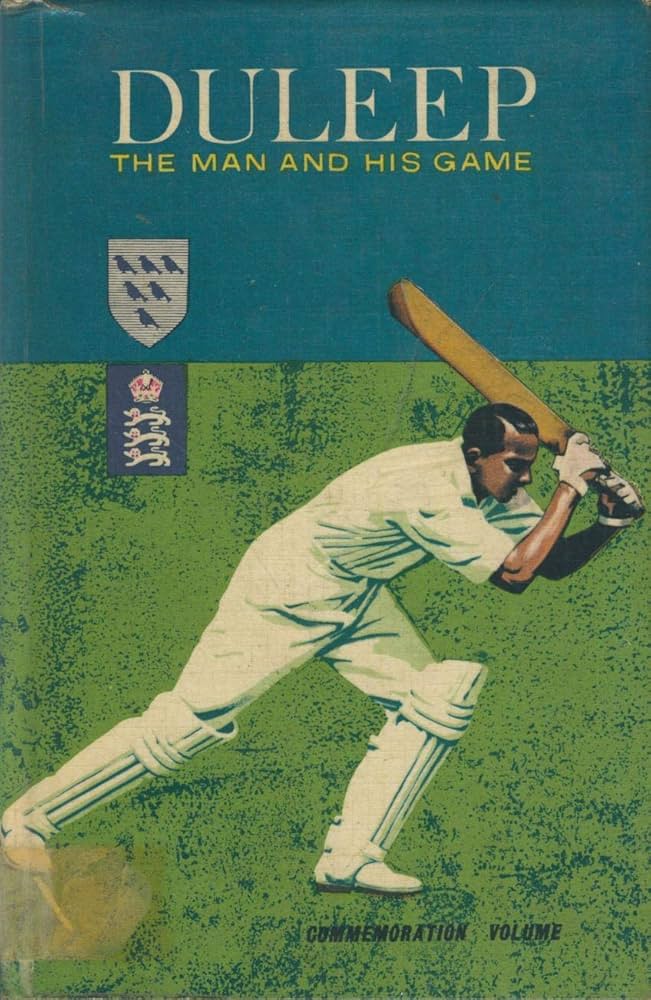Vijay Merchant et al, Duleep: The Man and His Game (1963)
When Robert Menzies arrived in India to make the first official visit to the country by an Australian prime minister, he told the assembled press ‘if two cricketing countries cannot understand each other, who can?’ While this was said partly in jest, in the early and somewhat fraught years of the relationship between the two nations, cricket was relied on heavily as a diplomatic tool. Not only had an Indian cricket team arrived in Australia for its first test tour only a couple of months after gaining independence in 1947, but one of the earliest High Commissioners sent by India to Australia was a distinguished ex-cricketer, named Duleepsinhji.
Born in Nawanager in 1905 to a family of local royalty, Duleep’s aristocratic connections saw him sent to England to study first at Cheltenham College and then Cambridge University. Playing for the local cricket club at each, his high batting average saw him selected to make his first class debut for Sussex in 1926. At a time before the Indian Test team had been established, Duleep instead had to content himself with making the English Test side, overcoming any potential prejudice to make his debut against South Africa in 1929.
Although Duleep only played in 12 Test matches, he earned an impressive batting average 58.52, and wowed many in Australia and New Zealand during the MCC tour of 1929-30 in which he top scored for his side. This reputation he earned in Australasia, where he also garnered significant press attention, likely influenced his appointment as High Commissioner to both countries. Arriving in Australia in late February 1950, he quickly befriended our cricket-mad prime minister. So much so that when in the years immediately after Duleep passed away, a book was collated to tell Duleep’s story and honour his memory, Menzies was asked to write the foreword:
‘Duleepsinhji was of course a superb cricketer. His all too brief record shows figures which would delight any cricket statistician. But his real secret was not to be found in averages, remarkable as they were. Above all, he was an artist, keen of eye, supple of wrist, with the feet of a ballet dancer, and a great hitter of the ball. We would hear less of how to “brighten the game” if we had a few more like him today.
But I would like to say something about Duleepsinhji as a diplomat – as High Commissioner for India in Australia. It is easy to forget what a Prince, of high family and ample means, must have felt when a new Republic was established and many hereditary titles and estates abolished or reduced. Some men in Duleepsinhji’s place, might have been unhappy or even bitter. But Duleepsinhji was two things – a great gentleman and a great patriot. In Australia, I was his close friend, and he was not unwilling to open his heart to me. I can therefore say that his sense of duty to India overcame all else. He believed in his country and its future. He was proud and willing to serve it in any capacity. So far from having any bitterness, he was all sweetness and light.
A famous cricketer, he needed no introduction to my cricket loving country. He was immensely popular in governmental, parliamentary, and diplomatic circles. He found himself entirely at home, and, as a welcome guest, presented an image of India which did much to further a true and friendly relation between his country and mine.
In short, Duleepsinhji had quite a unique career, both on and off the field. How vividly thousands of us will remember him; how sad we were to learn of his death; how much will he always stand in our minds as the perfect example of uprightness of stance and of character.
Australians have had fine associations with Indians. Your great players have given us great pleasure on and around the cricket fields. Your great statesmen have given us a great example of disinterested service and leadership. Duleepsinhji gave us something for everything. He had no enemies, but a host of friends.’
You might also like...
Sign up to our newsletter
Sign up for our monthly newsletter to hear the latest news and receive information about upcoming events.


